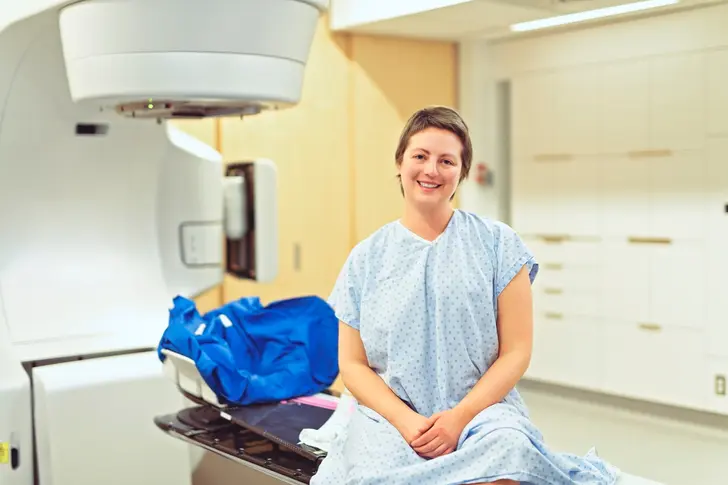- Overview
- Symptoms
- Risks, Prevention & Screening
- Tests & Diagnosis
- Types
- Your Breast Cancer Care Team
- Treatment
- Living With Breast Cancer
- Remission & Recurrence
- Advanced Breast Cancer
- Support & Resources
- Appointment Prep
- View Full Guide
Radiation Therapy for Breast Cancer


Radiation Therapy for Breast Cancer
Radiation therapy is a common treatment for breast cancer, often used after surgery to reduce the risk of cancer returning. For many years, it's been a standard part of care for women who've had breast-conserving surgery, also known as a lumpectomy. However, recent research suggests that some older women might be able to skip radiation without significantly increasing their risk.

New Findings for Older Patients
A groundbreaking study has shown that women over 65 with early-stage, hormone-receptor-positive breast cancer might safely skip radiation after a lumpectomy. This is particularly true for those taking hormone-blocking pills. The research found that women who were randomly chosen to skip radiation had the same 10-year survival rate as women who got the extra treatment. But those who didn’t get radiation were much more likely to have their cancer come back and need more treatment.

Weighing the Benefits and Risks
If you're an older woman with early-stage breast cancer, you might now have more treatment choices. Skipping radiation could mean fewer side effects and a simpler treatment plan. However, this option isn't suitable for everyone. Your decision should be based on factors like your overall health, the specific characteristics of your cancer, and your personal preferences.

Radiation Therapy Side Effects
While radiation can be effective in preventing cancer recurrence, it does come with potential side effects. These can include fatigue, skin irritation, and in rare cases, long-term effects on the heart or lungs. For older patients, these side effects might be harder to manage. By potentially avoiding radiation, some women might experience a better quality of life during and after treatment. But it's important to weigh these benefits against the small increased risk of cancer recurrence.

Hormone-Blocking Medication
For women with hormone-receptor-positive breast cancer, hormone-blocking medication plays a crucial role in treatment. These medications, taken for several years after surgery, help prevent cancer from returning by blocking the effects of estrogen on cancer cells. The study found that women taking these medications had good outcomes even without radiation.

Making an Informed Decision
If you're over 65 and have been diagnosed with early-stage breast cancer, talk to your oncologist about your treatment options. Discuss the potential benefits and risks of skipping radiation in your specific case. It's OK to ask questions and take time to make a decision that feels right for you. Your health care team is there to support you in making the best choice for your health.
PHOTO CREDENTIALS
Slide 1 - Lopolo/Shutterstock
Slide 2 - PaeGAG/Shutterstock
Slide 3 - Krakenimages.com/Shutterstock
Slide 4 - Ground Picture/Shutterstock
Slide 5 - Image Point Fr/Shutterstock
Slide 6 - PeopleImages.com - Yuri A/Shutterstock
SOURCES:
National Cancer Institute: "Breast Cancer."
CDC: "Breast Cancer."
Cancer.net: “Biopsy.”
BreastCancer.org: “Breast Cancer Stages,” “IDC Type: Cribriform Carcinoma of the Breast,” “IDC Type: Medullary Carcinoma of the Breast,” “IDC Type: Mucinous Carcinoma of the Breast,” “IDC Type: Papillary Carcinoma of the Breast,” “IDC Type: Tubular Carcinoma of the Breast,” “Male Breast Cancer,” “Metastatic Breast Cancer,” “Molecular Subtypes of Breast Cancer,” “Phyllodes Tumors of the Breast,” “U.S. Breast Cancer Statistics,” “What Is Mastectomy?”
Johns Hopkins Medicine: “Adenoid Cystic Breast Cancer,” “Breast Cancer in Men.”
Cleveland Clinic: “Breast Cancer.”
Breast Cancer Prevention Partners: “Breast Cancer Subtypes.”
CDC: “Breast Cancer: How Is Breast Cancer Diagnosed?” “Breast Cancer Screening Guidelines for Women,” “Breast Cancer: What Are the Risk Factors?”
National Breast Cancer Foundation: “Biopsy.”
American Cancer Society: “Breast Biopsy,” “Breast Cancer Risk Factors You Cannot Change,” “Can I Lower My Risk of Breast Cancer?” “Chemotherapy for Breast Cancer," “Hormone Therapy for Breast Cancer,” “Invasive Breast Cancer (IDC/ILC),” “Lifestyle-related Breast Cancer Risk Factors,” “Radiation for Breast Cancer,” “Surgery for Breast Cancer,” "Targeted Therapy for Breast Cancer,” “Treating Breast Cancer,” “What Is Breast Cancer?”
Cancer.net: “Breast Cancer Diagnosis,” “Breast Cancer: Introduction,” “Breast Cancer: Statistics.”
Mayo Clinic: “Breast cancer prevention: How to reduce your risk,” "Recurrent Breast Cancer."
Association of Directors of Anatomic and Surgical Pathology: “Breast Cancer,” “Breast Cancer In-Situ.”
Clinical Cancer Investigation Journal: “Low-grade adenosquamous carcinoma of the breast: A case report and review of literature.”
National Cancer Institute: “Cancer Stat Facts: Female Breast Cancer.”
International Journal of Surgery: "Low-grade adenosquamous carcinoma of the breast: A diagnostic and clinical challenge."
American Cancer Society: “Immunotherapy for Breast Cancer,” "Triple-negative Breast Cancer," "Survival Rates for Breast Cancer," "Breast Cancer Risk Factors You Cannot Change."
Mayo Clinic: “Breast cancer.”
Cancer.net: “Breast Cancer in Men: Statistics.”
Day Kimball Healthcare: "8 Tips for Good Breast Health | Breast Cancer Awareness Month."
Office on Women's Health: "99 Percent Survival Rate for Breast Cancer Caught Early."
Breast Cancer Metastasis and Drug Resistance: "Health and Racial Disparity in Breast Cancer."
New England Journal of Medicine: "Breast-Conserving Surgery with or without Irradiation in Early Breast Cancer."